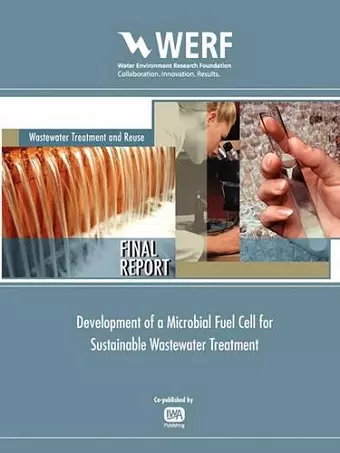Development of a Microbial Fuel Cell for Sustainable Wastewater Treatment
Michael Ellis author Nancy G Love author Ishwar Puri author
Format:Paperback
Publisher:IWA Publishing
Published:10th Dec '10
Currently unavailable, and unfortunately no date known when it will be back

Wastewater treatment is an energy intensive process that removes contaminants and protects the environment. While some wastewater treatment plants (WWTPs) recover a small portion of their energy demand through sludge handling processes, most of the useful energy available from wastewater remains unrecovered. Efforts are underway to harness energy from wastewater by developing microbial fuel cells (MiFCs) that generate electricity.
Key challenges to the development of microbial fuel cells include inefficiencies inherent in recovering energy from microbial metabolism (particularly carbon metabolism) and ineffective electron transfer processes between the bacteria and the anode. We explored the prospects for constructing microaerobic nitrifying MiFCs which could exhibit key advantages over carbon-based metabolism in particular applications (e.g., potential use in ammonia-rich recycle streams). In addition, we evaluated nanostructure-enhanced anodes which have the potential to facilitate more efficient electron transfer for MiFCs because carbon nanostructures, such as nanofibers, possess outstanding conducting properties and increase the available surface area for cellular attachment.
In the initial phase of this project, we investigated the performance of a novel nitrifying MiFC that contains a nanostructure-enhanced anode and that demonstrated power generation during preliminary batch testing. Subsequent batch runs were performed with pure cultures of Nitrosomonas europaea which demonstrated very low power generation. After validating our fuel cell hardware using abiotic experiments, we proceeded to test the MiFC using a mixed culture from a local wastewater treatment plant, which was enriched for nitrifying bacteria. Again, the power generation was very low though noticeably higher on the nanostructured anodes.
After establishing and monitoring the growth of another enriched nitrifying culture, we repeated the experiment a third time, again observing very low power generation. In the absence of appreciable and repeatable power production from pure and mixed nitrifying cultures, we focused on the second major objective of the work which was the fabrication and characterization of carbon nanostructured anodes. The second research objective evaluated whether or not addition of carbon nanostructures to stainless steel anodes in anaerobic microbial fuel cells enhanced electricity generation.
The results from the studies focused on this element were very promising and demonstrated that CNS-coated anodes produced up to two orders of magnitude more power in anaerobic microbial fuel cells than in MiFCs with uncoated stainless...
ISBN: 9781843393368
Dimensions: 234mm x 156mm x 18mm
Weight: unknown
68 pages